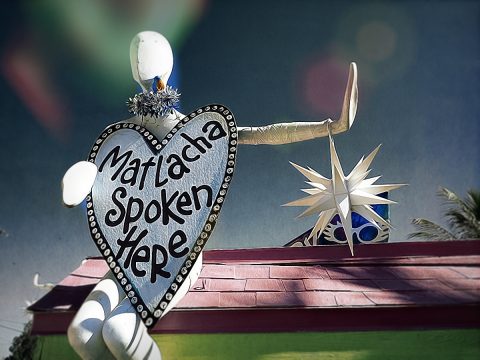What are some of the rewards and challenges you’ve found in approaching flash fiction?
Flash blows me away with its ability to concentrate, distill, compress, and find that thing (action, word, habit) that shows where (to quote Gary Indiana) the icky fish of a character’s mind really swims. Like poetry, flash has many forms. I like the longer forms—counterpoint and episodic—but I also love the efficiency of single scenes. I feel like writing may converge back to the sonnet, some new form of sonnet. Some cut-paper, GIF-flashing, Alfred Bester moment where all of a sudden a mind makes a leap and says Holy wordnado! Look what’s happened! In sum, flash is where it’s at. For me, the only thing better than writing flash is trawling art galleries in Chelsea, New York City.
One thing I found particularly striking about “Summer Baby” is the layers it contains. In fewer than three hundred words, we are given cicadas, labor pains, the circus acrobat, and Go, Dog. Go! Did you start with a particular idea or image? How did the piece evolve into its finished form?
I workshop flash weekly with a small, happy collective of writers and editors, and this was prompted by the word milestones. The group really brought its A-game that week. Short on time, I went to my little file folder of story starters, the woodpile, and that one line, “A girl will crawl out of the mud of me,” came from there. It originated at Eckleburg Workshops: Describe the circumstances of your birth. It was a matter of getting it under three hundred words, which flash writers know is where things get pointed. Then I remembered that photo of Paul’s, and it all clicked.
Often writers purposefully use ambiguity to their advantage, and I feel that’s happened here with the character Apollos. Is he the narrator’s son or husband? Or does it matter?
I don’t think it matters. Maybe Apollos packs in some Greek mythology, oracles, diviners, life, etc., into the story. His oracle is the circus lady. He divines and understands the sound through her message. The sound from nature, the truth, the birth, the milestone, the baby, come through her. The real baby also comes through a woman. That’s happening, but I think it’s also easy to say it’s the narrator’s husband. Well, then again, when Apollos gets involved it could be a son, could get Theban. Apollos, plus “my,” makes it all those things at the same time. Then again, maybe it was just my husband Paul and I having gin and tonics on the back porch in a thunderstorm. Apollos was a friend of the Apostle Paul. Isn’t that something, all that in a word. There’s an intimacy. Compress compress compress. In any case, the holy outcome will have become the child in the title.
Dr. Seuss’s Go, Dog. Go! exerts a strong—and unexpected—presence in the story, so much so, that in the last sentence of the story the narrator’s voice takes on Seuss’s diction. What led you to make this children’s book a controlling theme in the story?
I have not read that book since I was small, but it’s the binding agent of this story in a way. I wonder if it’s what I remembered! Dr. Seuss is really special because his stories are upbeat, kooky, language-intensive. It has surprises, trees, racecars, nonsense, and vanity. In “Summer Baby,” the narrator’s collapse into repetition means the moment of birth is near. Her repetitions and fragments mirror physical contractions, which any woman who’s had a natural childbirth can tell you are a complete juggernaut. Mother Nature messes with the narrator’s governor, which anybody who’s ever ridden the Grand Prix at an amusement park track knows is a naughty and awesome thing to do. The engine of life.
Besides Dr. Seuss, are their other writers who have been sources of inspiration for you?
I always say Yeats and Robbie Burns. I have sung Burns. They set my standards. Right now, the most tremendous things I’ve read are in the wheelhouse of prose-poetry and hybrid fiction. Sara Baume’s amazing “Green, Mud, Gold” in Granta 135, for instance. What a glorious, sustained cannonade of verse in prose! And Max Porter’s new hybrid novel, Grief Is the Thing with Feathers, deserves wide readership. It all seemed Jabberwockish on the surface, but then the patterns he’d built locked, and my empathy cascaded toward the main character. Very interesting how he made that happen, through repetition and imagery and symbols, synecdoche. Did you read the recent One Story, “Case Studies” by Charles Bock? Insanely good, and call it what you want, it was episodic flash! Victory! There are ten to twelve journals I read or subscribe to, and all I can say is that I can’t wait for the next story, the next issue. There is stunning writing happening, and I am convinced that flash is a driver.



 The core workshop of SmokeLong Fitness is all in writing, so you can take part from anywhere at anytime. We are excited about creating a supportive, consistent and structured environment for flash writers to work on their craft in a community. We are thrilled and proud to say that our workshop participants have won, placed, or been listed in every major flash competition. Community works.
The core workshop of SmokeLong Fitness is all in writing, so you can take part from anywhere at anytime. We are excited about creating a supportive, consistent and structured environment for flash writers to work on their craft in a community. We are thrilled and proud to say that our workshop participants have won, placed, or been listed in every major flash competition. Community works.